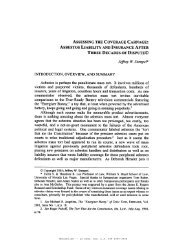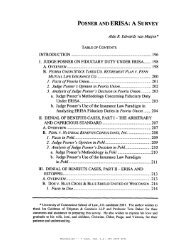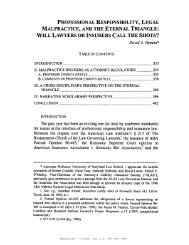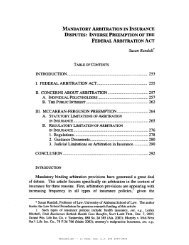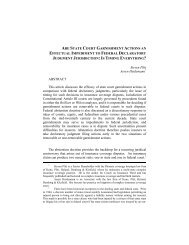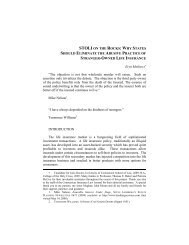Whither the Duty of Good Faith in UK Insurance Contracts, John Lowry
Whither the Duty of Good Faith in UK Insurance Contracts, John Lowry
Whither the Duty of Good Faith in UK Insurance Contracts, John Lowry
Create successful ePaper yourself
Turn your PDF publications into a flip-book with our unique Google optimized e-Paper software.
134 CONNECTICUT INSURANCE LAW JOURNAL [Vol. 16:1<br />
Mart<strong>in</strong>eau. 190 Fur<strong>the</strong>r, <strong>the</strong> clear implication seems to be that given that <strong>the</strong><br />
<strong>in</strong>surers or re<strong>in</strong>surers draft <strong>the</strong> policy terms; <strong>the</strong>re is more than adequate<br />
opportunity for <strong>the</strong>m to take <strong>the</strong> necessary steps to protect <strong>the</strong>mselves <strong>in</strong><br />
relation to <strong>the</strong> risks to be underwritten.<br />
C. ALIGNING THE INSURER’S REMEDY OF AVOIDANCE WITH THE<br />
DUTY OF UTMOST GOOD FAITH<br />
We have seen that <strong>the</strong> consequence <strong>of</strong> non-disclosure is to render<br />
<strong>the</strong> <strong>in</strong>surance contract voidable, <strong>the</strong>reby entitl<strong>in</strong>g <strong>the</strong> <strong>in</strong>surer to avoid it ab<br />
<strong>in</strong>itio. 191 Any premium paid is returnable to <strong>the</strong> <strong>in</strong>sured except <strong>in</strong> cases <strong>of</strong><br />
fraud (unless <strong>the</strong> policy o<strong>the</strong>rwise provides). 192 Not surpris<strong>in</strong>gly, as with<br />
<strong>the</strong> requirements <strong>of</strong> <strong>in</strong>ducement and waiver, <strong>the</strong> conditions govern<strong>in</strong>g <strong>the</strong><br />
exercise <strong>of</strong> <strong>the</strong> avoidance remedy have also attracted considerable judicial<br />
attention <strong>of</strong> late. Aga<strong>in</strong>, <strong>the</strong> views expressed have not been entirely<br />
consistent. In The Grecia Express, Colman J. suggested that <strong>the</strong> right to<br />
avoid is conditional upon <strong>the</strong> <strong>in</strong>surer act<strong>in</strong>g with “duty <strong>of</strong> <strong>the</strong> utmost good<br />
faith.” 193 He also reasoned, as commented above, that an <strong>in</strong>sured is entitled<br />
to litigate <strong>the</strong> issue <strong>of</strong> <strong>the</strong> truth or falsity <strong>of</strong> material circumstances <strong>in</strong> order<br />
to argue that, if it is shown to be <strong>in</strong>correct, <strong>the</strong> <strong>in</strong>surer would be act<strong>in</strong>g <strong>in</strong><br />
bad faith or unconscionably <strong>in</strong> avoid<strong>in</strong>g <strong>the</strong> policy. 194 In a similar ve<strong>in</strong>, <strong>in</strong><br />
Manifest Shipp<strong>in</strong>g Co. Ltd. v. Uni-Polaris Shipp<strong>in</strong>g Co. Ltd., 195 Lord<br />
Hobhouse, deliver<strong>in</strong>g <strong>the</strong> lead<strong>in</strong>g speech, identifies <strong>the</strong> need for some<br />
balance to be struck between <strong>the</strong> parties <strong>in</strong> <strong>the</strong> post-contract situation and<br />
suggests, as did Lord Mansfield <strong>in</strong> Carter v. Boehm, that <strong>the</strong> courts should<br />
guard aga<strong>in</strong>st <strong>the</strong> danger <strong>of</strong> <strong>the</strong> good faith duty be<strong>in</strong>g turned <strong>in</strong>to an<br />
190 (1782) 99 Eng. Rep. 591.<br />
191<br />
Abram Steamship Co. v. Westville Shipp<strong>in</strong>g Co., [1923] A.C. 773, 781.<br />
See also Glasgow Assurance Corp. v. Symondson & Co., (1911) 16 Com. Cas.<br />
109, 121 (Scrutton J., suggest<strong>in</strong>g that <strong>the</strong> only remedy available for non-disclosure<br />
is avoidance <strong>of</strong> <strong>the</strong> contract).<br />
192 PARK, supra note 18, at 218. The Mar<strong>in</strong>e <strong>Insurance</strong> Act, 1906, 6 Edw. 7,<br />
c. 41, § 83(3)(a) (Eng.) provides, “Where <strong>the</strong> policy is void, or is avoided by <strong>the</strong><br />
<strong>in</strong>surer, as from <strong>the</strong> commencement <strong>of</strong> <strong>the</strong> risk, <strong>the</strong> premium is returnable,<br />
provided that <strong>the</strong>re has been no fraud or illegality on <strong>the</strong> part <strong>of</strong> <strong>the</strong> assured . . . .”<br />
193<br />
Strive Shipp<strong>in</strong>g Corp. v. Hellenic Mut. War Risks Ass’n (Bermuda) Ltd.<br />
(The Grecia Express) [2002] EWHC 203.<br />
194 Id.<br />
195 [2003] 1 A.C. 469, 496-97.



